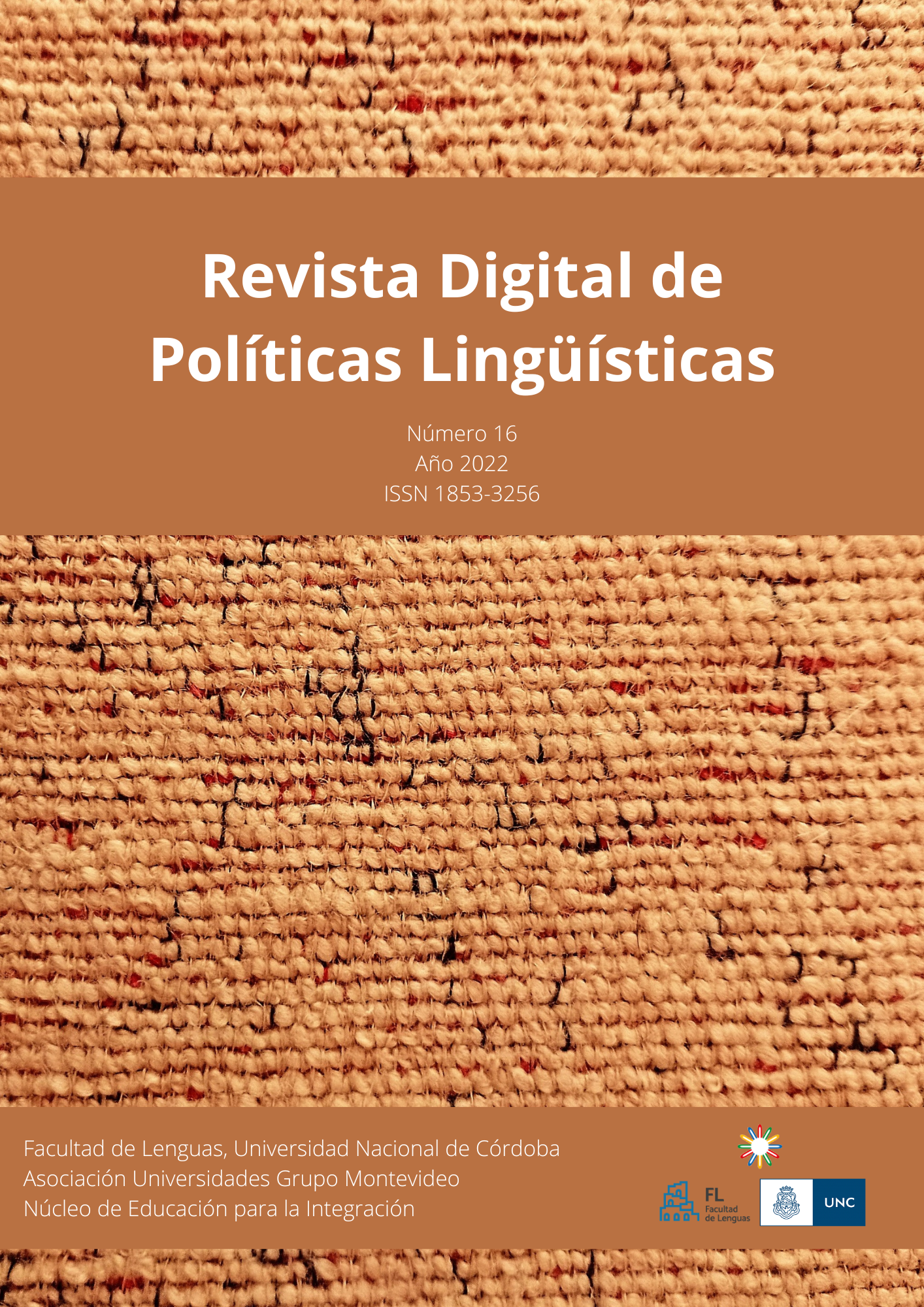English as the Dominant Language for Academic Communication: Conflicting Representations and Ideologies of Argentine Junior Researchers
Keywords:
representations, ideologies, scientific communication, English, junior researchersAbstract
The supremacy of English as the language of scientific communication brings into play two central aspects of communication. On the one hand, it is an opportunity for writers from peripheral contexts to participate in an international discourse community, make their research visible globally and gain greater prestige and recognition. On the other hand, however, it represents an enormous challenge and highlights the existence of asymmetric conditions for knowledge production and dissemination between those who belong to central, hegemonic spheres of the Anglophone discourse community and those who struggle to participate from the periphery. With a qualitative approach, I will explore the representations of novel Argentinian writers about publishing research in English, addressing both linguistic and ideological issues.
References
Ammon, U. (2003). Global English and the non-native speaker. Overcoming the disadvantage. En H. Tonkin & T. Reagan (Eds), Language in the Twenty-first century (pp. 23-34). John Benjamins Publishing Compay.
Ammon, U. (2006). The status and function of English in Germany. Revista Canaria de Estudios Ingleses, 53, 27-33. https://riull.ull.es/xmlui/bitstream/handle/915/17167/RCEI_53_%28%202006%29_03.pdf?sequence=1&isAllowed=y
Arnoux, E. N. (2000). La Glotopolítica: transformaciones de un campo disciplinario. Primer Simposio en la Maestría en Ciencias del Lenguaje, Instituto de Educación Superior “Joaquín V. González.
Arnoux, E. N. (2016). Minorización lingüística y diversidad: en torno al español y al portugués como lenguas científicas. En E. Rinesi et al (Comp.), Hombres de una república libre Universidad, inclusión social e integración cultural en Latinoamérica (pp. 251-267). Los Polvorines: Universidad Nacional de General Sarmiento.
Arnoux, E. N., & del Valle, J. (2010). Las representaciones ideológicas del lenguaje. Discurso glotopolítico y panhispanismo. En J. del Valle & E. N. de Arnoux (Eds.), Spanish in Context, número especial Ideologías lingüísticas y el español en contexto histórico (pp. 1-24). CUNY: John Benjamins Publishing Company. https://doi.org/10.1075/sic.7.1.01nar
Bein, R. (2012) La política lingüística respecto de las lenguas extranjeras en la Argentina a partir de 1993. Tesis de Doctorado. Universidad de Viena. Austria.
Calvet, L. J. (1997). Las políticas lingüísticas [Les politiques linguistiques. Paris:PUF, 1996]. Trad. L. Varela. Buenos Aires: Edicial.
Corcoran, J., & Englander, K. (2016). A proposal for critical-pragmatical pedagogical approaches to English for research publication purposes. Publications, 4(6), 1-10. https://doi.org/10.3390/publications4010006
Curry, M. J., & Lillis, T. (2017). Problematizing English as the privileged language of global academic publishing. In M. J. Curry & T. Lillis (Eds.), Global academic publishing: Policies, practices, and pedagogies (pp. 1-22). Multilingual Matters.
de Swaan, A. (2001). Words of the world: The global language system. Cambridge: Polity Press.
de Swaan, A. (2010). Language systems. En N. Coulpland (org.). The handbook of language and globalization (pp. 56-76). London: Blackwell.
Díaz Galán, A., & Fumero Pérez, M. del C. (2010). El académico español y la comunicación científica en inglés: estudio de una comunidad universitaria específica. Revista española de lingüística aplicada, (23), 111-128. https://dialnet.unirioja.es/descarga/articulo/3898683.pdf
Eagleton, Terry. 1991. Ideology: an introduction. London: Verso.
Flowerdew, J. (2007). The non-anglophone scholar on the periphery of scholarly publication. AILA Review, 20, 14-27. https://doi.org/10.1075/aila.20.04flo
Hamel, R. E. (2010). Engaging a plurilingual scientific community. Anthropology News, 51(5), 17.
Hamel, R. E. (2013). El campo de las ciencias y la educación superior entre el monopolio del inglés y el plurilingüismo: elementos para una política del lenguaje en América Latina. Trabalhos em linguística aplicada, 52, 321-384. https://doi.org/10.1590/S0103-18132013000200008
Lopardo, H. (2019). La ciencia y el idioma. Acta Bioquímica Clínica Latinoamericana, 53(2), 159-160.
Mair, C. (2019). English in the German-speaking world: An inevitable presence. In R. Hickey (Ed.) English in the German-speaking world, (pp.13-30). Cambridge University Press.
Mendieta, E., Phillipson, R., & Skutnabb-Kangas, T. (2006). English in the geopolitics of knowledge. Revista Canaria de Estudios Ingleses, 53, 15-26. https://dialnet.unirioja.es/servlet/articulo?codigo=2195542&orden=0&info=link
Polo, F. J. F., & Varela, M. C. (2009). English for research purposes at the University of Santiago de Compostela: A survey. Journal of English for Academic Purposes, 8(3), 152-164. https://doi.org/10.1016/j.jeap.2009.05.003
Roseti, L., & De Francesco, K. (2017). Inglés: la lengua extranjera por antonomasia. Revista Digital de Políticas Lingüísticas, 9(9), 54-66. https://revistas.unc.edu.ar/index.php/RDPL/article/view/19029/18946
Salager-Meyer, F. (2008). Scientific publishing in developing countries: Challenges for the future. Journal of English for academic purposes, 7(2), 121-132. https://doi.org/10.1016/j.jeap.2008.03.009
von Stecher, P. (2020). Dime en qué lengua publicas y te diré qué tipo de científico eres. Reflexiones de Pío del Río Hortega sobre la lengua, el patriotismo y las comunicaciones científicas. Boletín de Filología, 55(1), 29-457. https://revistaestudiosarabes.uchile.cl/index.php/BDF/article/view/57743/61273
Downloads
Published
Issue
Section
License

This work is licensed under a Creative Commons Attribution-NonCommercial-NoDerivatives 4.0 International License.
Aquellos/as autores/as que tengan publicaciones con esta revista, aceptan los términos siguientes:
- Los/as autores/as conservarán sus derechos de autor y garantizarán a la revista el derecho de primera publicación de su obra, el cual estará simultáneamente sujeto a la Licencia de reconocimiento de Creative Commons que permite a terceros compartir la obra siempre que se indique su autor y su primera publicación esta revista.
- La cesión de derechos no exclusivos implica que la publicación de los artículos en la presente revista no quita la posibilidad o el derecho al autor de publicar de manera posterior a otras revistas u órganos editoriales y la autorización por parte de los autores para que el trabajo sea depositado en los repositorio institucionales: Portal de Revistas de la Universidad Nacional de Córdoba.



